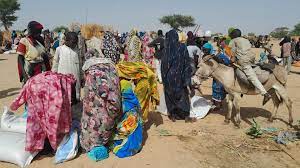Aid agencies urges world leaders to assist refugees, host nations
“Strong political will and solid leadership are needed to achieve the objectives set out in the Global Compact on Refugees,”

More than ten international aid agencies on Wednesday called on world leaders to honor their commitment to support refugees and the countries hosting them, through increased and equitable responsibility-sharing.
The 13 aid agencies under an umbrella body, the Inter-Agency Working Group for East and Central Africa (IAWG), said the leaders taking part in the second Global Refugee Forum (GRF) in Geneva, Switzerland, this week should commit to addressing the root causes of displacement in East and Central Africa.
“Strong political will and solid leadership are needed to achieve the objectives set out in the Global Compact on Refugees,” IAWG said in a statement issued in Nairobi, the capital of Kenya.
IAWG said the GRF presents a crucial opportunity for the world’s governments to demonstrate their willingness to do more, and better, on refugee protection and responsibility-sharing through renewed pledging commitments.
“However, four years after the first GRF took place, we know that pledges, by their voluntary and non-binding nature, may not be enough to guarantee stronger protection and support for refugees and host communities,” IAWG said.
According to IAWG, about 4 million refugees are hosted by just four countries in East Africa — that is over 10 percent of the global number of refugees.
IAWG said those host countries already face a multitude of challenges ranging from violent conflict and continued mass displacement to chronic poverty, climate change, and domestic food insecurity, which are crippling their ability to provide sustained and adequate financial support for refugees and asylum seekers.
Ethiopia, Sudan, and Uganda are among the top 10 refugee hosting countries globally, while also ranking in the top 20 countries with the lowest Human Development Index, IAWG said.
It urged global leaders to meet their moral obligation and international commitments to share responsibility for the world’s refugees and provide sustained and equitable support to refugees and asylum seekers, wherever they may be.
IAWG said a growing number of refugees move to cities in search of new opportunities to provide for themselves and their families due to limited support available in dedicated camps and settlements.
“However, urban-based refugees are too often overlooked within refugee responses and are sometimes ineligible for humanitarian assistance. As a result, they are forced to compete with urban and low-income host communities, compounding the strain on limited services and resources in the host country.”
- Advertisement -
- Advertisement -



